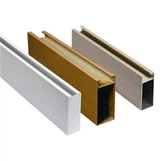Hey there! As a supplier of Aluminum Profiles, I often get asked about the coefficient of thermal expansion of aluminum profiles. It's a pretty important topic, especially for those who are using or planning to use aluminum profiles in their projects. So, let's dive right in and explore this topic together.
First off, what exactly is the coefficient of thermal expansion? Well, it's a measure of how much a material expands or contracts when its temperature changes. Every material has its own unique coefficient of thermal expansion, and this value can have a big impact on how the material behaves in different temperature conditions.
When it comes to aluminum profiles, the coefficient of thermal expansion is relatively high compared to some other materials. The coefficient of linear thermal expansion for aluminum is approximately 23.1 x 10^-6 per degree Celsius (or 13 x 10^-6 per degree Fahrenheit). What does this mean in plain English? It means that for every degree Celsius increase in temperature, a one - meter long aluminum profile will expand by about 0.0000231 meters, or 0.0231 millimeters.
This expansion might seem small, but in large - scale applications or in situations where precision is crucial, it can have a significant effect. For example, if you're using aluminum profiles in a building's structural framework, the expansion and contraction due to temperature changes over the seasons need to be taken into account. Otherwise, it could lead to stress on the structure, which might cause damage over time.
In the manufacturing process of Aluminum Profiles, understanding the coefficient of thermal expansion is also vital. When we're cutting, shaping, and assembling the profiles, we need to consider how the material will react to temperature changes during and after the manufacturing process. If we don't account for this, the finished products might not fit together properly or might develop cracks or other defects.
One of the advantages of aluminum profiles is that despite their relatively high coefficient of thermal expansion, they are still very versatile and useful in many applications. For instance, in the automotive industry, aluminum profiles are widely used because of their lightweight nature. The engineers in this field know how to design the components in such a way that the thermal expansion doesn't cause any major problems. They use techniques like allowing for expansion gaps or using flexible connections to accommodate the changes in size.
In the electronics industry, aluminum profiles are often used for heat sinks. The high thermal conductivity of aluminum, combined with its coefficient of thermal expansion, allows for efficient heat transfer. When the electronic components generate heat, the aluminum profile expands slightly, but this expansion is usually within the design limits of the heat sink system.
Now, let's talk about how we, as an Aluminum Profiles supplier, deal with the coefficient of thermal expansion. We have a team of experts who are well - versed in the properties of aluminum. They use advanced software and simulation tools to predict how the profiles will behave under different temperature conditions. This helps us to provide our customers with high - quality products that are designed to perform well in various environments.
We also offer customized solutions. If you have a specific project with unique temperature requirements, we can work with you to develop aluminum profiles that are tailored to your needs. Whether it's modifying the alloy composition or adjusting the manufacturing process, we'll do our best to ensure that the thermal expansion characteristics of the profiles meet your expectations.


If you're in the market for Aluminum Profiles, you might be wondering how to choose the right ones for your project. Here are a few tips. First, consider the temperature range your profiles will be exposed to. If it's a project in a hot climate, you'll need to pay extra attention to the thermal expansion. Second, think about the level of precision required. If your project demands high accuracy, you'll want to work with a supplier who can guarantee tight tolerances even with temperature changes.
We're always here to assist you with your aluminum profile needs. Whether you're a small - scale DIY enthusiast or a large - scale industrial manufacturer, we have the products and expertise to support you. If you have any questions about the coefficient of thermal expansion or any other aspect of aluminum profiles, don't hesitate to reach out. We can have a detailed discussion about your project and help you make the best choice.
In conclusion, the coefficient of thermal expansion of aluminum profiles is an important factor that needs to be considered in many applications. But with the right knowledge and proper design, it doesn't have to be a problem. As a reliable Aluminum Profiles supplier, we're committed to providing you with top - notch products that take into account all the relevant physical properties of aluminum. So, if you're looking to purchase aluminum profiles for your next project, we'd love to talk to you and see how we can help.
References
- "Materials Science and Engineering: An Introduction" by William D. Callister Jr. and David G. Rethwisch
- Various industry reports on aluminum profile applications and properties




